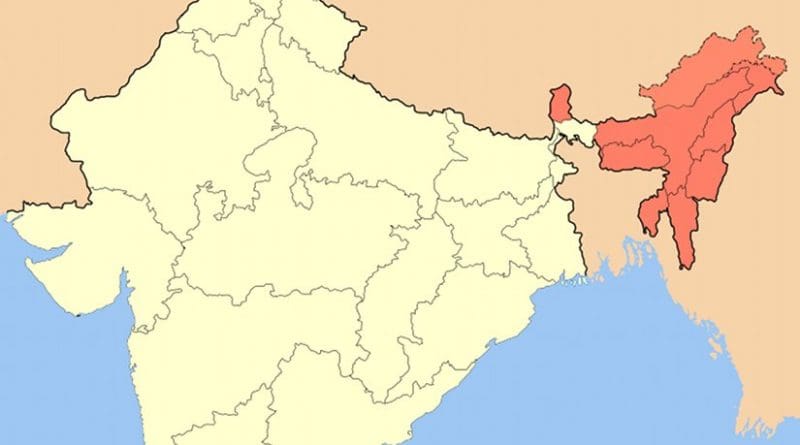Bangladesh’s Role In The Security Of Northeastern States Of India – OpEd
India had always found Bangladesh by its side when needed. The bilateral security relation had always been reciprocal. Bangladesh has shown its commitment to the security issues of India. Especially the trend started when the prime minister of Bangladesh Sheikh Hasina Came into power. As well as, the credit for a reciprocal security relationship goes to the Prime Minister for addressing India’s security concerns.
The northeast region of India is one of the most vulnerable areas in terms of security. Security cooperation has been a major feature in Bangladesh–India bilateral ties. India sees Bangladesh as the closest partner in ensuring security in its geographically disadvantaged northeast states. The security issues like terrorism, insurgency, and separatist movements in the northeast region have been controlled and managed, partly because of the immense help provided by Bangladesh. Bangladesh has taken significant steps in dealing with major northeastern insurgent organizations and maintained close cooperation with India in terms of intelligence sharing and security matters. In addition, Bangladesh has also entered an Extradition Treaty with India in January 2013 to address the security concerns of each other and strengthening mutual trust. With the treaty, India gained a way to clamp down on insurgency in the northeastern region of the country. Not only that, the militants of northeastern states failed to get any shelter in Bangladesh because of the land border agreement with Bangladesh signed in 2015. This stopped them from carrying out their operations for separatist movements and insurgencies in the North East. The incumbent Indian External Affairs Minister S Jaishankar showed his gratitude towards Bangladesh by saying that, the terrorist activities in the country’s northeast region have declined because of India’s strategic land boundary pact with Bangladesh.
Terrorism is one of the pressing security issues in both Bangladesh and India. As mentioned before, Bangladesh has a significant role in fighting terrorism in northeastern states as they had been facing longstanding insurgency movements. In the past, the insurgents used to use the territory of Bangladesh as their base. But this situation was strong-handedly mitigated after Prime Minister Sheikh Hasina came into power. Her commendable actions against the terrorists have contributed to opening up a new era of cooperation between the two countries.
For example, Bangladesh handed over top Ulfa leader Anup Chetia, a founding member of one of India’s top insurgent groups United Liberation Front of Asom (Ulfa), to India 18 years after his arrest in Dhaka for trespassing. This person had been in prison since his arrest in Mohammadpur on December 21, 1997. It was a major boost to bilateral security cooperation between India and Bangladesh. Not only that, Bangladesh sent back some other top Ulfa leaders, including Arabinda Rajkhowa, in 2009 through the border with the northeastern Indian state of Assam. Both extraditions expedited the process of peace talks between the separatists and New Delhi.
Moreover, the government of Sheikh Hasina strengthened oversight mechanisms in border areas to arrest any kind of smuggling of illegal consignments for the insurgents operating in the northeastern states of India. Bangladesh has handed over to India a list of several factories operating inside their country including some close to the border of northeastern states of India which produced phensidyl only targeting Bangladesh as its market. The phensidyl produced in those factories, set up by the Indian businessmen, were being smuggled into Bangladesh by organized cross-border syndicates.
The northeastern states are almost detached from the Indian mainland. The terrorists and separatists take the advantage of the “Chicken’s Neck” and carried out their insurgent movements in these states. Bangladesh, in turn, has been always by India’s side in combating the situation though some views of India and Bangladesh are completely different. Therefore, the divergent views of India and Bangladesh to understand security issues need to be synchronized for mutual benefit. Only active security engagement between the two countries would help in transforming relations from the present state of mutual suspicion to one of mutual benefit and mutual trust. Both of the countries should consider the bilateral issues from a pragmatic view to reach a consensus on contentious bilateral issues as well as to further strengthen this relationship to a new horizon of development. A long-standing durable relationship between the two countries is necessary to maintain stability in the northeastern states of India.


Well described every aspect of the border security between India and Bangladesh. But the question remains why India is still killing unarmed civilians at the border. If there is an smuggling issue which should be addressed under the code of the law. Despite numerous appeal and complain it never changed its position of killing. India is a bureaucratically polluted country which will say one thing but do something else. Time has come to raise the question why it will not be declared as a terrorist country because of uninterrupted violation of Human rights. I hope the so called largest democracy in the world will woke up and change its behavior to prove they are indeed a civilized nation. No hard feelings here India is still a great friend of Bangladesh but this question of killing should be addressed and must be stopped.